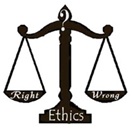|
 |
|
 |
|
|
||
Immanuel Kant - Philosophy, Learning and Ethics
Immanuel Kant (1724-1804)
German philosopher (pictured right), professor and a leader of the Enlightenment, the European movement dedicated to learning and scientific progress.
His most famous book is... The Critique of Pure Reason (1781).
What did he say about learning and ethics?
1. Curiosity and reason Kant: a) loved learning and wisdom One of his students said “nothing worth knowing was indifferent to him”. He was resolute in his defence and pursuit of wisdom.
b) believed in the power of reason (critically evaluating every idea to discover its truth). “Dare to know” was the motto he gave to the Enlightenment.
2. The “categorical imperative” Kant described this as “Live your life as though every act were to become a universal law” In other words:
For example, always be:
See others as the reason for action i.e. treat them as an end not the means to an end. 3. Good intentions, principles and attitudes You must want to do good i.e. have good motives (or intentions) and principles. Use virtues (like love and courage) to do good and not evil. Good actions can only come from a sense of duty (see point 2). 4. Never lose your sense of wonder and excitement Recognize and admire the beauty of the world around you:
He admired two things more than any others: “the starry heavens above me and the moral law within me”.
5. Believe in God You can’t prove that God exists, but you can still have faith in Him. As he put it, he “found it necessary to deny knowledge in order to make room for faith”.
6. Accept that people aren’t perfect Everyone has weaknesses, so what anyone does will be imperfect. “Out of the crooked timber of humanity, no straight thing was ever made”, he said.
7. The world is what we think it is Perception is vital. If you think the world is great, it will be. 8. Ask yourself three questions To be happy ask yourself:
Then put your answers into action based upon an honest assessment of your strengths and weaknesses.
Key quotes on learning and wisdom Dare to know (the motto of the Enlightenment).
Key quotes on ethics Live your life as though every act were to become a universal law (the categorical imperative). The death of dogma is the birth of morality. Do what is right, though the world may perish.
Key quote on success Only the descent into the hell of self-knowledge can pave the way to godliness.
Key quote on design The beautiful is the symbol of the morally good.
Key quotes on business ethics Out of the crooked timber of humanity, no straight thing was ever made. By a lie a man throws away and, as it were, annihilates his dignity as a man.
Key quote on human resource management Always recognize that human individuals are ends, and do not use them as means to your end.
Key quote on nature Two things fill the mind with ever new and increasing admiration and awe...the starry heavens above me and the moral law within me. |
|
|
||
|
|
||
| Copyright © wisdomtowin.com 2025 All Rights Reserved | ||
|










